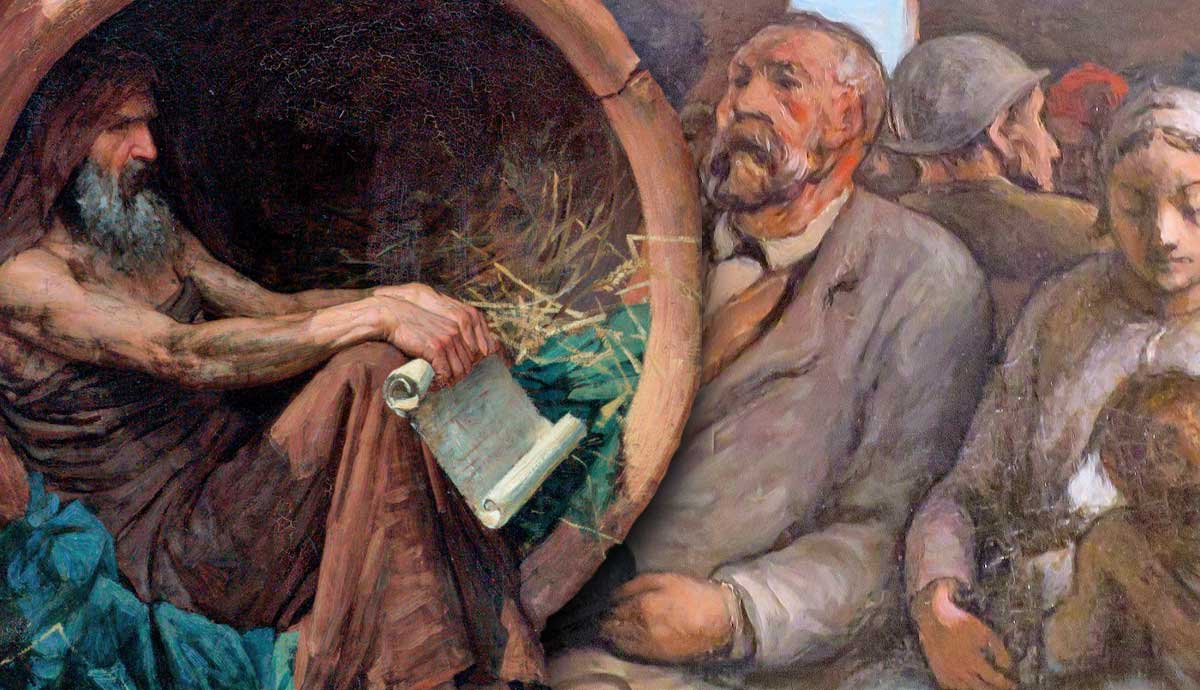
Mistaken in many cases for mere skepticism or pessimism, Cynicism is a school of philosophy that explores the depth of truth and accord with nature. The root of Cynicism was the ancient Greeks, who elaborated with bitter irony on the tenets of conventional society. From Diogenes, wandering in broad daylight among the streets of Athens in search of an honest man, to where we perceive the Cynicism of today—what would it have to say about living meaningfully?
Historical Background of the Philosophy of Cynicism

The philosophical school of Cynicism was founded in the 4th century BC in ancient Greece. The Cynics used to call themselves dog-like people, plainly meaning that they opposed every way of convention and lived quite strangely for their time.
In other words, Diogenes and his followers lived in an upturned storage jar with no worldly goods other than a cloak, a staff to help them hobble in and out of the dungeons of their own minds, and a bread bag. They also walked the talk and adopted an ascetic approach towards living life, in contrast to the abundant materialism of the day.
They preferred life on the streets, openly adopting poverty as a good thing, and laughed at the chains of the rich, powerful, and high-status people they found themselves tied to their fellow citizens. Their dogma rested on a return to nature, to life elaborated in the spirit of what is natural and necessary without any artificial excess.
At the center of Cynicism was getting back to basics: living as nature intended and not being bothered about anything else. Society’s rules were seen by Cynics as bad for you—they wanted out of this system—so they said go for extreme simplicity instead and do everything yourself. They also believed that if you’re good, then you’re happy—and nothing can affect this state of mind. It doesn’t matter what happens to you externally.
Fundamentally, though, their philosophy was one of honest living and acting genuinely from genuinely given nature. In their view, goodness and moral virtue were intrinsic in a meaningfully lived life. The cynics did not believe in luxury and excesses but meant to exercise strength and stamina through self-discipline and ethical living.
Core Tenets of Cynical Philosophy

Adherents of Cynicism believed that most were disillusioned by the false promises offered by consumer culture.
Cynical philosophy insists on the fact that only virtue is the true good itself, and that moral excellence suffices to make a person happy. The Cynics, mostly embodied by figures like Diogenes and Antisthenes, believed material fortunes, power, and status were just detriments, distracting and an obstacle to keeping their end of living authentically.
Central to Cynic practice was parrhesia, the rant of free speech which entitled one to take to the public whatever it was that had to be said without ornament, indirection, or fear of consequences. This concept empowered them to challenge societal norms and question established conventions with unwavering conviction.
For example, the Cynics were very ascetic about their lives, living a modest lifestyle devoid of luxury and castigating anything in excess. All this sums up in a simplistic way of life that aimed at being self-sufficient and freeing the Cynic from external influences that could threaten the virtues they pursued.
Authenticity, with the Cynics, meant living according to nature, not that of animals or plant life, but as it was perceived through a person’s inward reality and truth. So, making one’s deeds conform to that inward reality, they tried to achieve autonomy from material possessions and inner serenity.
In the world now ordered by avarice and ambition, Cynicism points towards the hard anti-ideals: an unorthodox angle on what defines life lived uniquely meaningful in the direction of moral integrity and self-governance. This inheritance inspired contemporary thinking on questions of values, priorities, and choices.
The Impact of Cynicism on Other Philosophical Thoughts

Cynicism, the term used to ensure human treatment of sincerity, autarchy, and natural life, was one of the main sources for later philosophical movements. More particularly, Early Stoicism shared some ideas with Early Cynicism, but it was not the same movement.
Both Cynicism and Stoicism strongly stressed virtue as the highest good and an emphasis on hardening an attitude of inner resilience and moral integrity. Where the Cynics favored extremism and absolute rejection of norms in society, Stoics suggested a more median approach, which is a call to live in accordance with nature but inside society’s engagement with it.
The Cynical focus on simplicity and detachment related to other related philosophies like Epicureanism and Minimalism. In short, through its ever-changing focus on pleasure as the highest good, it shares in the latter a certain level of disdain for things like unnecessary wants and the material.
It wouldn’t be appropriate not to talk about Minimalism, the latest movement in contemporary lifestyle, which glorifies the same ideas that Cynicism has about modest living and finding pleasure and happiness in the essentials.
From these similarities, every philosophy considers simplicity and detachment from very distinct perspectives. Where the Cynics considered renunciation yet another perfect means of liberating oneself from the shackles imposed by society, the Stoics considered detachment a way one may achieve peace inside no matter what goes on around them.
These nuanced differences outline the rich tapestry of thought that has evolved over time from the foundational principles of Cynicism.
Manifestations of Cynicism in the Modern Context

In our modern era, Cynicism’s ideas remain relevant as they continue to influence people’s thinking in ways that can make them question accepted customs and values. One current example of this is how aspects of Cynicism can be seen in a backlash against consumerism and a growing movement for sustainable living.
For instance, some individuals who reject the idea that buying lots of things leads to happiness are influenced by Cynical ideas about finding contentment through simplicity and not being too caught up in desires. They may also think it is better for the environment if we do not make and throw away so much stuff.
On social media platforms, we can see a digital version of Cynicism, where users express disagreement with mainstream viewpoints or challenge those who hold traditional power. Through memes, satire, and online activism—using humourous or skeptical writing or videos to criticize authority figures, institutions, or cultural norms—people communicate this contemporary Cynicism.
In contemporary society, there is a growing desire for authenticity and transparency in relationships and interactions. People want to have genuine connections with others without pretending to be something they are not or engaging in superficial conversation or behavior. This emphasis on living honestly and without hypocrisy is also important to Cynics.
Another way we see Cynicism today is through self-help books. More and more people are reading guides about how to develop mental strength, emotional intelligence, and resilience—the ability to bounce back from tough times. These ideas connect with both Stoicism and Cynicism because both philosophies teach that you can (and should) grow as a person even when life is difficult.
The specifics of Cynicism might have changed over time, but if you look closely enough, traces of this ancient philosophy are everywhere.
Why Is Cynicism Often Criticized?

Critics argue that today’s understanding of Cynicism often draws flak for appearing too pessimistic about life and humanity. It questions people’s motives to such an extent that self-interest is considered the main driver, thereby eroding trust in society—which some say can be corrosive.
Take philanthropy as an example. A modern-day Cynic may see charitable behavior not as being motivated by altruism alone but also by factors like wanting to look good publicly or tax breaks. If so, suspicion could devalue acts of kindness altogether and promote a culture of doubt.
Or politics: here, someone who is cynical now might start from a default position that any politician at all must be corrupt or a liar. This could lead them not to take part in politics (because what’s the point if they’re all as bad as each other?)
In addition, Cynicism is also under fire because it has the potential to be a self-fulfilling prophecy. If you expect people to behave badly, your attitude may actually help provoke the very behavior you anticipate.
If you assume that a coworker will act selfishly and respond defensively or competitively in advance, for example, you may inadvertently encourage this response, which can ultimately corrode trust and cooperation within an organization.
Advocates say that while healthy skepticism can be useful, too much Cynicism might contribute to a culture where nothing ever improves because nobody believes in good intentions anymore—leading to further negativity all around. The challenge lies in finding ways to stay critical while remaining open enough.
So, What Is the Philosophy of Cynicism?

The philosophy of Cynicism revolves around leading a simple life centered on virtue in order to achieve happiness. It originated in ancient Greece, where Cynics such as Diogenes argued that individuals did not require wealth and influence to be genuinely content.
According to the Cynics, joy stems from behaving naturally and not coveting societal values that prove insignificant upon closer examination. They also promoted radical honesty—even if it appeared brutal—as a means of critiquing social norms that most people accept uncritically.
These days, if we describe someone as cynical, we usually mean they’re negative — expecting the worst to happen and thinking people are mainly out for themselves. This isn’t what the ancient Cynics meant: far from being downbeat all the time, they wanted a life without unnecessary worries.
But there is a problem with this modern kind of Cynicism. If everyone is always negative and does not trust anyone else, it becomes very difficult for us to have faith in—or work with—one another! So, in order to be truly happy, say the old Cynics, we need to learn how to simplify our lives and concentrate on being good people.










